
Search
At first glance, you wouldn’t think the cow resting in a wood, stone and corrugated metal corral on Erastus Njuguna’s farm in Kiambu County, Kenya, has anything to do with the low slung, black rubber structure lying like an inflated air mattress a few feet away or the blue biogas flame flickering inside his home. In fact, the bovine and biodigester work in tandem generating enough biofuel (methane gas) from cow dung and water to power two burners in Njuguna’s farmhouse.
TaroWorks client Sistema.bio manufactures, sells, installs and services these hybrid reactor biodigesters, which transform animal manure from small and medium size farms into biogas for clean cooking and a nutrient-rich organic fertilizer. With more than 4,800 biodigesters installed in Mexico, Latin America, East Africa and India, this social enterprise has helped over 30,000 people produce 19,200 cubic meters of renewable energy per year while mitigating more than 85,000 annual tons of CO2 and improving the living standards of thousands of smallholder farmers. (Read More)
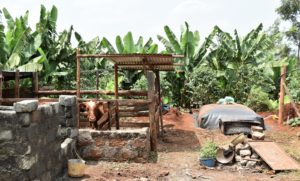
Image: Farmer Erastus Njuguna’s cows and Sistema.bio’s biodigester side-by-side on his farm in Kiambu County, Kenya. Source: TaroWorks
Here in Kenya (and around the world), Sistema.bio uses TaroWorks’ field service mobile app — which is integrated with the Salesforce.com cloud database — to help quote, size, sell, install and service a network of biodigesters producing biofuel primarily for domestic smallholder farmers in three key areas: Kiambu, Kericho and Meru counties.
“We use TaroWorks every single day,” said Raymond Chepkwony, Sistema.bio’s Kenya Country Director who we met at the social enterprise’s Githunguri branch office before making the 30 kilometer trip to Njuguna’s farm. “From collection of data, to how we aggregate that data, and what we do with that data in terms of decision-making in how we set up our operations…”
Sistema.bio team members took me, my colleague Margaret Wanjiru, TaroWorks’ Technical Product Manager, and board members from our parent organization Grameen Foundation, into the field so we could get a first-hand look at how TaroWorks is being used to efficiently manage the daily activities of Sistema.bio’s field agents. They are using our offline mobile CRM, to conduct a range of tasks in these rural areas with little or no internet or mobile phone connectivity.
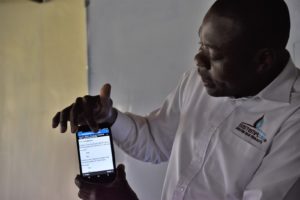
Image: Sistema.bio Technical Supervisor John Ouma demonstrates how field staff use TaroWorks on a smartphone. Source: TaroWorks
The biodigesters, like the one we saw on our farm visit, serve as a hybrid reactor into which a farmer can input a mixture of dung (typically from a cow although pig dung is of high quality) and water and over a period of time produce biofuel (in this case methane gas) that is piped into the farmer’s home and used for cooking. Additionally, the other output is rich manure that a farmer can use to offset the costs of top-dress fertilizer.
So where does TaroWorks come into play in the production of this biofuel? John Ouma, Technical Supervisor at Sistema.bio’s Githunguri branch office, said that for field technicians who install the biodigesters, the first place to start with TaroWorks is site validations. Sistema.bio has built a specific form into the TaroWorks mobile app that allows the field technician to record observations on their mobile devices like the condition of the land and the best place to locate the biodigester (away from water and trash burning areas but near to where the cows are kept and close to the farmer’s home). The field technician can complete the form (even if he or she is offline), leave observational notes, take photos of the site and sync all of this information to a cloud database so that office staff can have real-time visibility into each one of the technicians day-to-day operations.
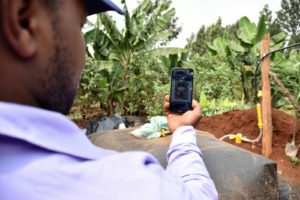
Image: Joseph Wambugu, a Senior Technician at Sistema.bio, takes photo of the biodigester and gas delivery system using TaroWorks. Source: TaroWorks
A powerful TaroWorks feature that Sistema.bio uses daily is a two-way flow of information. Not only are field technicians logging their visit details while offline, but they can also look up information like personal tasks, farmer histories and training videos locally on their mobile device offline. This is key to Sistema.bio’s operations because the same technician won’t necessarily come back to complete the actual biodigester installation; therefore, the technician in charge of installation will need to view the details and notes from the previous site validation.
Sistema.bio also uses a checklist built inside TaroWorks to guide the technician on the proper steps for installing the biodigester and generating biofuel. Field agents must confirm that the dimensions of the trench dug for the biodigester are correct and that there is enough water and manure ready for the initial feeding of the biodigester. Other questions to confirm include: Is laying of the gas line 100% complete and has the farmer participated in user manual training with the Sistema.bio field technician? These are a few examples of the prompts given to the technician by the TaroWorks software to help optimize time and make sure the farmer fully understands proper procedures and maintenance involved in producing and distributing biofuel.
Sistema.bio customer Njuguna had his biodigester installed three weeks before our visit to his farm in Kenya’s Central Province so now Joseph Wambugu, a Sistema.bio Senior Technician, was going to review the final preparation steps with Njuguna before testing the biofuel for the first time inside the farmer’s home. We watched as Sistema.bio Country Director Chepkwony and Njuguna scooped up the appropriate ratio of manure and water and, along with Wambugu, prepared the mixture to be put into the biodigester.
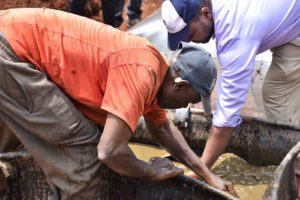
Image: Kenyan farmer Erastus Njuguna and Joseph Wambugu of Sistema.bio prepare a water and manure mixture for the biodigester. Source: TaroWorks.
Using the checklist built inside the TaroWorks mobile app for this phase of the installation, Joseph guided Erastus through some last routine maintenance steps for the system (which valves to turn when and how often to change one of the filters). Then, the moment had finally arrived. Erastus invited us into his home where we saw the two burners lit with biogas for the first time! No more spending hard earned income on liquid petroleum gas or firewood. The smile on Joseph’s face watching the biofuel flames dance was one that I soon won’t forget.
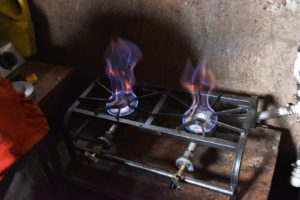
Image: Sistema.bio biogas cookstove in Kenyan farmer Erastus Njuguna’s home. Source: TaroWorks
Finally, how does Sistema.bio use the data captured, analyzed and visualized by TaroWorks and Salesforce.com to measure the impact of their biodigesters on smallholder farmers? How is the organization making strategic operational decisions? Part of the information collected on Sistema.bio customers using TaroWorks focuses on how much the farmers would spend on firewood, charcoal or liquid petroleum gas for cooking needs and how much is spent on top- dress fertilizer.
The results show that the farmer will have offset their initial investment in the biodigester in about one year. This is a very powerful statement Sistema.bio can use to help earn the trust of farmers who are unfamiliar with their biodigesters. Chepkwony and his Sistema.bio team have used the demographic data to expand operations to the midwest of Kenya because they now understand that this region will be a driving force for larger biodigester units since there aren’t as many limitations on land size.
Chepkwony believes that Sistema.bio has the potential to reach close to a million farmers in Kenya. To that end, the organization is also using TaroWorks and Salesforce to provide asset-based consumer financing to help smallholder farmers purchase the biodigesters.
And Njuguna? He is already planning on being able to take tea in the middle of the night courtesy of the biogas now available to him.
Many TaroWorks customers previously used paper and spreadsheets to collect data, analyze metrics and run field operations. Let us show you how TaroWorks’ offline mobile field service app can help scale your business by digitizing sales and supply chain management, increasing agent network productivity and analyzing data in real-time for business insights.
POST TOPICS
Sign up to receive emails with TaroWorks news, industry trends and best practices.
TaroWorks, a Grameen Foundation company.
Site by V+V